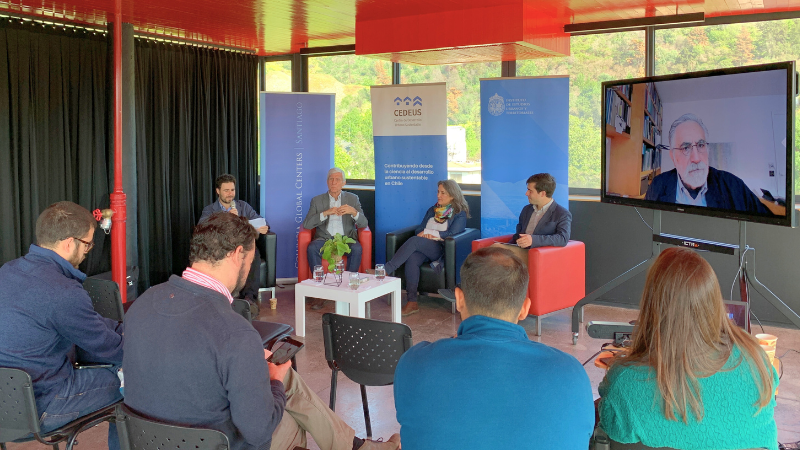Seminar Series on Urban Regeneration Brings Global Perspectives to Chile
The fourth event of the cycle focused on territorial development and decentralization and featured two Columbia graduates.

The cycle of seminars on Urban Regeneration, born in 2022 through a collaboration between Columbia Global Centers | Santiago, Universidad Católica’s (UC) Institute of Urban and Territorial Studies (IEUT), UC’s Center for Sustainable Urban Development (CEDEUS), and Columbia’s Institute of Latin American Studies (ILAS), aims to delve into mechanisms and opportunities for urban area regeneration in Chile. It also seeks to analyze experiences and best practices implemented in cities across Latin America and around the world. From its inception, the organization of the series has been led by Sebastián Salas (GSAPP’22), a Research Fellow at ILAS, who, with the support of the Institute and the Santiago Center, has conducted an in-depth case study exploring urban regeneration experiences in Santiago.
Discussions throughout the sessions have honed in on the concept that urban regeneration should be a comprehensive intervention in the territory, addressing its physical, social, and economic dimensions. Past speakers, influential in regeneration processes in cities like New York, Bogotá, Quito, and Santiago, have shared insights on how governance structures guide urban regeneration processes. They have also discussed financing mechanisms, instruments, and robust participatory processes.
The fourth seminar, titled “Challenges of Territorial Development and Decentralization for Urban Regeneration,” took place on October 26 at UC’s Lo Contador campus. It delved into three key topics: the economy of decentralization, national development and decentralization policies, and decentralization and local capacity. The keynote speaker of the event was Leonardo Romeo (SEAS’82), professor of International Development Planning at New York University. A prominent researcher, teacher, and consultant in decentralization projects and territorial and local development planning processes, Romeo is also the president of Local Development International (LDI), a consulting firm offering urban advisory services to developing countries. Additionally, he served as the Principal Technical Adviser for Local Development Planning for the United Nations Capital Development Fund (UNCDF) for over a decade.
Romeo's presentation delved into the political and institutional changes needed for a territorial approach to local development. He emphasized the importance of empowering local governments and providing them with the necessary capacities to plan and advance in the economic, social, and environmental development of their territories. Romeo highlighted concerns that even in developed countries, the national decentralization policy does not align with decentralization capacity because it does not acknowledge its potential, adding that “development is territorial when it’s: endogenous, incremental, integrated, and multilevel.”
Following Romeo’s presentation, a panel discussion moderated by Salas included Carlos Cruz, executive director of the Infrastructure Policy Council (CPI) and former Minister of Public Works, Transportation, and Telecommunications; Catalina Justiniano, executive director of the National Territorial Development Council (CNDT) and former director of the Junto al Barrio NGO, and Nicolás León (SIPA’18), Studies and Public Policy Manager at the Chilean Chamber of Construction (CChC) and former Executive Director of the Idea País think tank. The panel reflected on and discussed the challenges, opportunities, and institutional changes necessary to implement better urban regeneration policies in Chile. The country faces a deficit of over 600,000 housing units, and more than three million people live without adequate access to basic infrastructure, services, connectivity, and equipment.
The experts addressed how public policies are tackling the need to generate neighborhoods with access to commerce, public services, green areas, and transportation. They also discussed how, beyond large cities, planning and regeneration of small cities and rural towns are being considered. Additionally, they explored the role of the private sector and how it can play a relevant part in regeneration processes, impacting people's lives and promoting more inclusive, prosperous, and sustainable human development.